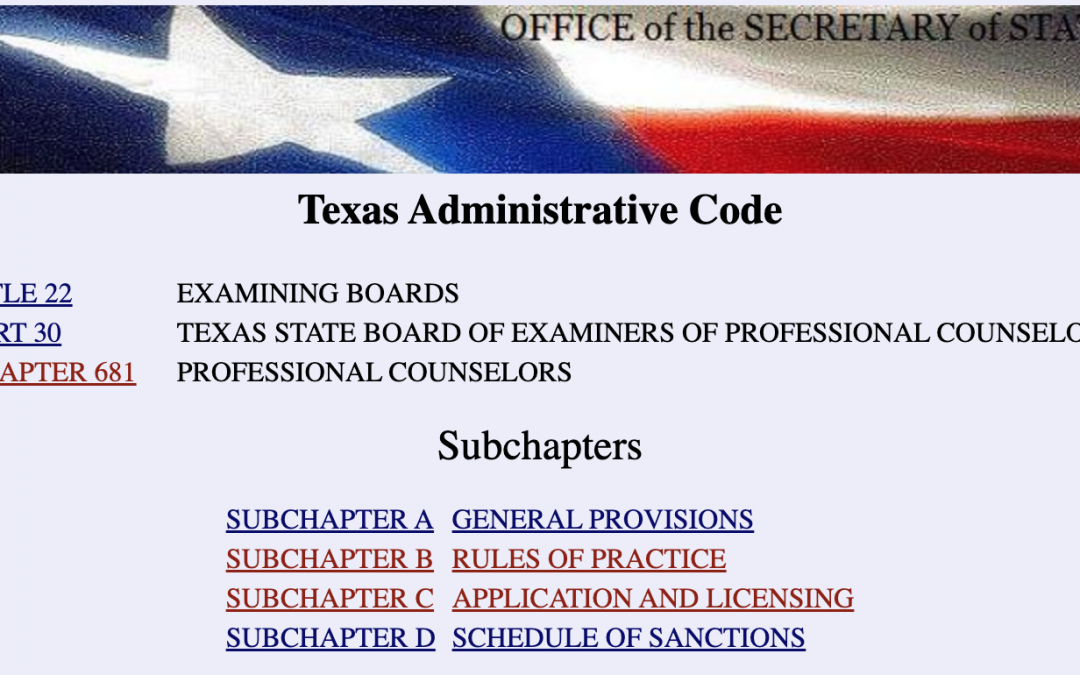While you’re in supervision, it’s important to know the supervision expectations and requirements. Board ethics and administrative codes are areas that are not reviewed as often as needed although should be expected during clinical supervision. While your supervisor may not be applying and reviewing the Texas administrative code and ethics in the manner they should, this does not exempt you from knowing the expectations.
This article will review many of the supervision expectations that many LPC associates are unaware of. Most all of the rules are taken directly from title 22, part 30, chapter 681 of professional counselors under the Texas administrative code. For associate level clinicians in the licensed marriage and family therapy, psychology, and social work field, it is important to look directly into that specific ethical and administrative code.
-
-
- All associates must complete supervised experience of 3,000 clock hours- a minimum of 1,500 direct client counseling contact. Only actual time spent counseling may be counted.
- “Actual time spent counseling” is subjective to what your supervisor will count as a direct- some supervisors are more stringent and only count traditional one to one/face to face counseling, whereas another may be willing to count direct services like case management as acceptable hours.
- Direct hours occur within a professional relationship with clients when the associate uses a combination of mental health and human development principles, methods, and techniques to achieve the mental, emotional, physical, social, moral, educational, spiritual, or career-related development and adjustment of the client throughout the client’s life.
- The LPC Associate must receive direct supervision consisting of a minimum of four (4) hours per month of supervision.
- Of the 4 hours, no more than 50% of the total hours of supervision may be received in group supervision.
- Group supervision consist of 3 or more clinical associates to be present while individual is one to 2 Associates
- If an extended leave of one month or more is needed by the associate, it must be approved in writing and kept on record by your supervisor.
- Your supervisor must keep a written document of your supervisory agreement form, copy of your LPC associate license, fees and record of payment, date of each supervision session a record of leave of absence for one month or more, and any concerns suggestive of a remediation plan.
- Your supervisor must provide a copy of all of the above to you upon request.
- Your supervisor can never “surprise you” with a remediation plan. Concerns must always be reviewed between the two of you and must be in written form if remediation is to take place. The form must also be signed by both parties with intent to commit to the plan to implement the remediation.
- Your supervisor must submit to the council your supervised experience within 30 days of the end of your supervision together or the completion of your LPC associate required hours, which ever comes first. Within 30 days!
- You may never complete your supervision within 18 months. Even if your 1500 direct hours is completed within 18 months, you must still wait for the 18 month mark from the first date of beginning your hours. No exceptions.
- If your supervisors license expires for some reason, he/she must immediately inform all LPC associates under their supervision. They must also aid in helping each LPC associate find an alternate supervisor.
- If a supervisors license expires and is no longer an approved supervisor, he/she must refund all supervisory fees for supervision after the expiration date.
- Here’s the bad news. Hours accumulated under a supervisor whose license has expired may not count as acceptable hours towards your licensure.
- An LPC associate may have up to two supervisors at one time, not more.
- An LPC Associate license will expire 60 months from the date of issuance.
-
Just remember, even if your supervisor chooses not to apply ethics directly into supervision, this does not discount you from the responsibility of knowing them yourself. Side note- if your supervisor doesn’t apply ethics into supervision, you need to find another supervisor.

